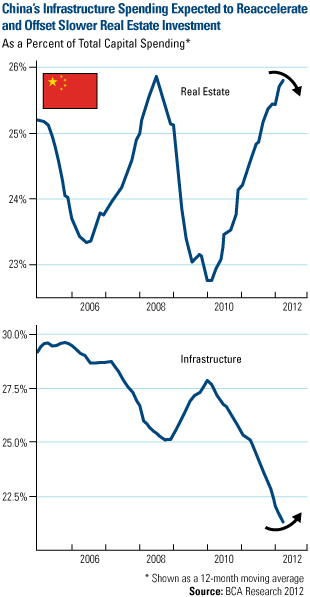Emerging Markets Radar (April 30, 2012)
Strengths
- The Czech prime minister won backing in parliament on Friday for his austerity program and avoided early elections. His administration’s goal is to reduce the fiscal gap to 2.9 percent of GDP next year from 3.1 percent last year.
- China HSBC April flash PMI was 49.1, improved from the prior month reading of 48.3.
- China’s central city of Wuhan allows some first-time home buyers to pay as little as 20 percent down payments with loans from the public housing fund, the official Xinhua News Agency reported this week. Also first-time home buyers in major cities are offered a 15 percent mortgage rate discount (to benchmark mortgage rates) from banks.
- Korea’s consumer confidence rose to 104 in April from 101 the previous month.
- The oil and gas sector in China is looking to raise gas prices following Qiqihaer, and a new oil pricing scheme is expected to be rolled out soon according to the China Securities Journal.
Weaknesses
- Russian banks are demanding from corporate borrowers the highest interest rates in one-and-a-half years as capital flight reduces the banks’ ability to fund loans. Loan costs for companies rose to an average 9.8 percent in March, from 9.3 percent in February, according to the Central Bank in Moscow.
- Singapore’s CPI inflated more than estimated in March, rising 5.2 percent.
- Chinese industrial companies’ profits dropped 1.3 percent in the first quarter from a year earlier, the National Bureau of Statistics said on its website this week.
Opportunity
- Turkey’s income level, growth prospects, “solid” state finances and banking system give the country the potential to attain investment grade, said a Fitch analyst. Fitch currently rates Turkey at BB+, one step below investment grade.
- Hungary has presented a very tough austerity plan this week, which has been taken well by the European Commission (EC). Hungarian investors have been very bearish over the past few weeks and months regarding Hungarian financial markets as they have not believed that Prime Minister Orban could convince the EC to start negotiations about a new financial aid package.
- In the chart below by BCA, the growth rate of China’s infrastructure investments is expected to pick up in the second half of the year after the government is accelerating approvals for railways, highways, and water systems projects. This move, to a certain extent, will offset the slowdown in property investments. As a result, it should positively impact materials and commodity and bank lending.

Threats
- In this earnings season, the Hong Kong market is under pressure due to earnings disappointments and lower earnings forecasts.
- The Romanian government lost a vote of no confidence, bringing into question key elements of the reform and privatization. The International Monetary Fund mission has already announced that it is suspending its negotiations with Romania until a new government has been formed. In terms of the equity market, this is obviously negative news with respect to the timing of the planned IPO/SPO pipeline.











